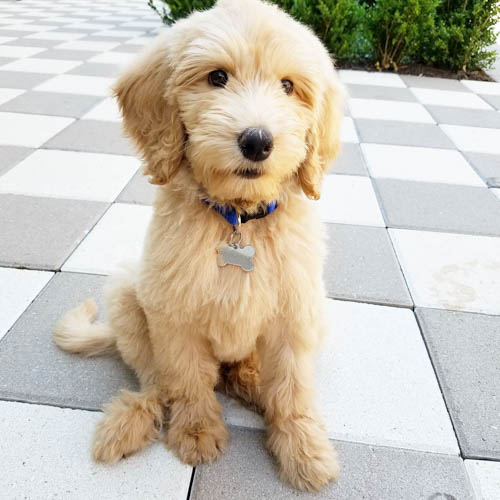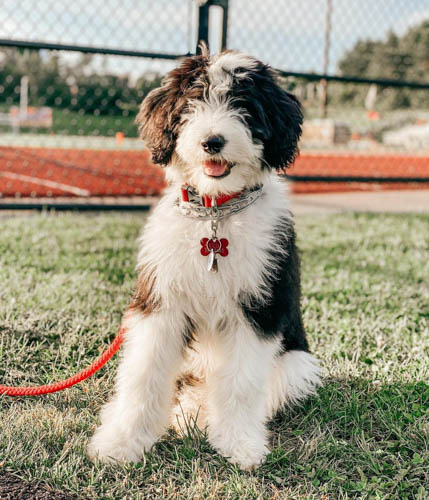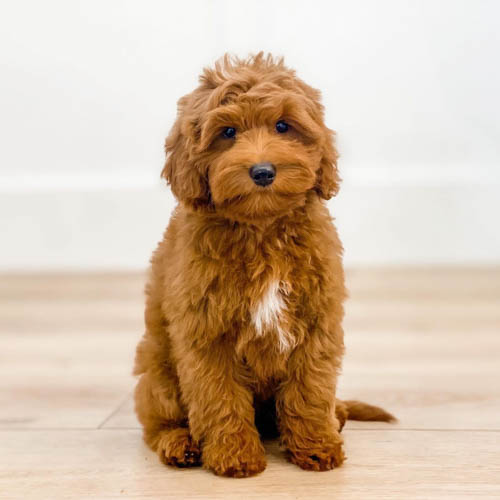Poodles are mixed with either Old English Sheepdogs or Golden Retrievers in the Sheepadoodle and Goldendoodle dog breeds. Sheepadoodles are distinguished by their black and white coats and tall height.
Goldendoodles are becoming a popular home breed and one of the most popular crossbreed dogs. They can also be trained to work as guide dogs, service dogs, or emotional support animals.
Furthermore, because of their kind dispositions and flexible attitudes, they are beneficial to the entire family.
Sheepadoodles are a relatively new breed in the Doodle world, but they quickly gain appeal as designer dogs.
Goldendoodles have already become popular, with their bright personality and hypoallergenic characteristics filling households. These hybrids are large dogs who enjoy running around, playing and bonding with their owners.
Goldendoodle

Goldendoodles are a popular dog breed in the United States. The Goldendoodle is a well-known breed, whether you’re seeking loyalty, a hypoallergenic dog, or a low-shedding type. They’re bred with generational constancy throughout the country and the world, from the Sunbelt to the Rust Belt.
When you mix a Poodle with a Golden Retriever, you get this breed. They can also be crossed with Moyer Poodles to produce a smaller dog. These are the smallest Goldendoodles available.
The Goldendoodle is a skinny, eternal puppy that lives for 12 to 15 years on average. In their cheerful temperament and remarkable Poodle intelligence, Goldendoodles are sometimes likened to Labradoodles.
Goldendoodles are a wonderful choice for first-time or apprehensive dog owners since they are easy to train. They aren’t known to be violent, but they require adequate socialization to avoid shyness or fearfulness.
Goldendoodles also require regular touch with their owners; if they are left alone for an extended period, they will develop separation anxiety.
Caring for them and offering toys and snacks to keep them occupied during the day is the best method to prevent harmful behavior. Another wonderful technique to keep them pleased is to keep the radio playing while you’re out.
Goldendoodles are considered non-shedding to mild shedders, making them a suitable fit for allergy sufferers. They do need to be brushed regularly or biweekly, and many owners choose to have them trimmed.
Even though Goldendoodles are a new designer breed, their value has been recognized. They’ve gained a lot of popularity in a short amount of time, and their star is continuously rising. They are wonderful family dogs and offer gentle, intelligent company for the rest of their lives.
Sheepadoodle

The Old English Sheepdog is a large, fluffy-haired dog frequently seen on the English courtside, well sheltered from the weather. This makes it a great breed to mix with the Standard Poodle, another traditional European dog.
The Sheepadoodle is almost too good to be true: a Newfoundland-style dog that doesn’t shed nearly as much as a Newfoundland and is just as beautiful.
This breed’s black-and-white markings are similar to the Old English Sheepdogs, but the hair texture is slightly different. Your Sheepadoodle will almost certainly be non-shedding and hypoallergenic, regardless of the generation.
Hybrid dog breeds, on the other hand, have a less stable genetic composition. Therefore you’ll find them with a variety of coat colors and styles. What we do know is that both dog breeds are tall and have a similar face shape. Finding a breeder you know and trust might be the most difficult aspect.
The sheepadoodle’s origins are hazy at best: While humans have been crossbreeding dogs for as long as there have been breeds, sheepadoodles as a distinct hybrid just gained popularity in the last decade or so.
According to some sources, the “doodle” name tradition began in 1992, which is when the idea of combining poodles to produce a line of low-shedding canines began to gain traction.
The sheepadoodle’s ancestors, on the other hand, have a long history. Old English sheepdogs were created as drovers or dogs that assisted cattle in moving through dusty roads to market in the west of England.
Their tails were clipped to show that they were working dogs (and to keep them away from stray hooves), earning them the moniker “bobtail.”
On the other side of the sheepadoodle family comes an even earlier breed: the Poodle, which originated in France via Germany as a duck-hunting dog, is one of the oldest purebred canines. They were outstanding retrievers because of their curly coat, which protected them from cold water and superior intellect.
Size Comparison

Goldendoodles often weigh 45 to 60 pounds, making them big dogs in general. They’re also taller than the typical person, standing between 20 and 26 inches tall when completely grown.
These dogs acquire their height from their Poodle ancestors and a few extra inches from their Golden ancestors. The Goldendoodle has the advantage of being available in smaller sizes.
To fit your lifestyle, there are teacup, micro, mini, and larger Goldendoodle sizes available, ranging in weight from 10 to 35 pounds.
The Sheepadoodle is a massive dog, weighing approximately between 60 to 80 pounds on average! In addition, their height can range from 17 to 23 inches. However, some males might be considerably bigger.
Depending on the size category of the Poodle’s parentage, they also come in medium and tiny sizes; however, these are considerably less frequent.
Life Expectancy

Sheepadoodles have a lifespan of 12 to 15 years, which is fairly long for a dog breed of this size. They may easily survive for 15 years or longer with regular veterinary care, healthy food, and enough exercise.
The Goldendoodle has a life expectancy of 12 to 15 years, placing them on par in longevity and health. It’s worth noting that smaller dogs, such as the tiny Goldendoodle, live far longer.
As a hybrid dog breed, they may have health concerns that cause them to live shorter lifetimes. However, preventative care can help mitigate these risks. Purebred Golden Retrievers have a shorter lifespan than mixed-breed Golden Retrievers, contributing to the disparities between the two breeds.
Temperament
Goldendoodles are devoted and clever companions that will never abandon you. They’re intelligent and can learn toilet training and other commands at a young age.
These Poodle hybrids get along well with other pets and humans in the house. They form attachments rapidly, just like the Golden Retriever, and continually try to please their favorite humans.
The Sheepadoodle is an active dog who enjoys swimming and fetching or even a mix of the two. Furthermore, this dog is extremely intelligent, which leads to the rapid acquisition of new tricks and behaviors that their owners are ready to teach them.
They’re large and clumsy, so they’ll need to be educated to avoid crashing into their owners and even furnishings in the house.
In general, the Goldendoodle and the Sheepadoodle are high-energy dogs, so be prepared to keep up with them. Because a Goldendoodle has more energy than a Sheepadoodle, you’ll need to be prepared to keep them entertained.
Appearance

The Goldendoodle has a distinct appearance that has made it popular in the United States and worldwide. Goldendoodles are generally light brown and have a comical look. Even as adults, they have the appearance of a puppy.
It’s worth noting that hybrid dogs, like the Goldendoodle, have a wide range of appearances. Depending on the genetic makeup of the particular dog, they may resemble a Poodle or a Golden Retriever.
Sheepadoodles are large canines with black and white patterns that are stunning. The size of an Old English Sheepdog is comparable to that of a Great Dane or a Newfoundland. The size is still remarkable when mated with a Standard Poodle, with even fluffier hair.
Both the Goldendoodle and the Sheepadoodle will be adorable canines with beautiful, fluffy coats. If you’re seeking black and white hues, the Sheepadoodle is the way to go. The Goldendoodle, on the other hand, is a good choice if you prefer a teddy bear look.
Grooming

Goldendoodles are slightly smaller than standard poodles, but they still require care to avoid matted and untidy fur. They may be groomed at home, but it takes a long time to groom your dog to look beautiful without knots or mats.
When it comes to grooming, sheepadoodles are quite the undertaking. They’re big dogs with a lot of furs that have to be professionally groomed. If you cannot groom your Sheepadoodle yourself, be prepared to pay a significant sum to have your Sheepadoodle groomed by a professional.
Both the Sheepadoodle and the Goldendoodle will require weekly grooming to keep them looking their best. Brushing their teeth, cleaning their ears, and trimming their nails should all be done at least once a week. Because they don’t shed, the Goldendoodle and Sheepadoodle require a lot of shedding and are ideal for those with allergies.
Cost
Sheepadoodles and Goldendoodles are both highly popular dogs; therefore, they may be rather costly. Neither dog is commonly relinquished, but in exceptional circumstances, you might be able to locate one in a shelter for approximately $500.
Due to its popularity, the Goldendoodle is more costly, but expect to pay around $1,200 or more for a puppy of either dog from a breeder. If you want a puppy with certain traits, like specific coat color or size, you should expect to pay much more than the average.
The Goldendoodle, like the Sheepadoodle, is a rather costly breed to care for. These breeds are huge dogs, which means that everything from dog beds to dog food to grooming and medical care will be more expensive.
In terms of size, the Sheepadoodle is on another level, which may be costly when looking for equipment, services, or even clothes for your pet. Adopting any of these hybrids is expensive. However, the Sheepadoodle is somewhat more expensive altogether.
A Goldendoodle or Sheepadoodle can cost anywhere from $1,500 to $4,000 initially, depending on their size. The initial expense isn’t the most expensive aspect of dog ownership. You should budget at least $1,000 each year to keep your dog healthy and pay for medical expenses.
Training

Because of the Poodle and the Old English Sheepdog characteristics, Sheepadoodles are regarded as one of the smartest dog breeds. These breeds are known for their intelligence, which allows them to thrive in obedience and training programs.
It’s critical to teach them when they’re puppies since their enthusiasm and intelligence may get them into trouble. If they are not properly taught as they grow larger, their size can do significant damage.
Goldendoodles, on the other hand, are easy to teach owing to their Poodle-like intelligence. Due to their intelligence and calm attitude, Golden Retrievers are frequently used as guide dogs, service dogs, and therapy dogs.
According to a fascinating statistic, poodles are at the front of the pack when it comes to intellectual dog breeds. Both the Sheepadoodle and the Goldendoodle can learn advanced instructions and require involvement to prevent bad home behavior.
Conclusion
Goldendoodles and Sheepadoodles are excellent companions. If you’re ready for a four-legged companion, either one will provide you with years of love and companionship.
Though the Sheepadoodle and Goldendoodle are quite similar, the size of the two canines is the most significant distinction. The Sheepadoodle is often larger and heavier than the Goldendoodle. This is particularly crucial to consider if you live in a tiny house or apartment.
Both Sheepadoodles and Goldendoodles are beautiful doodle breeds. Sheepadoodles are known for their big stature and black and white coats.
The Goldendoodle, on the other hand, is unquestionably the most popular dog, with a wide range of coat colors and sizes available from a variety of breeders.
Goldendoodles have slightly more energy than Sheepadoodles in general. Because they don’t shed and are hypoallergenic, both dog breeds require a lot of care. While both dogs make excellent family companions, they require a lot of attention.
Prepare to devote a significant amount of time to exercising and grooming two mixed breeds. While it’s common knowledge that both dogs are expensive, don’t forget that they also need a significant amount of time.
We hope you learned something new about Goldendoodles and Sheepadoodles!